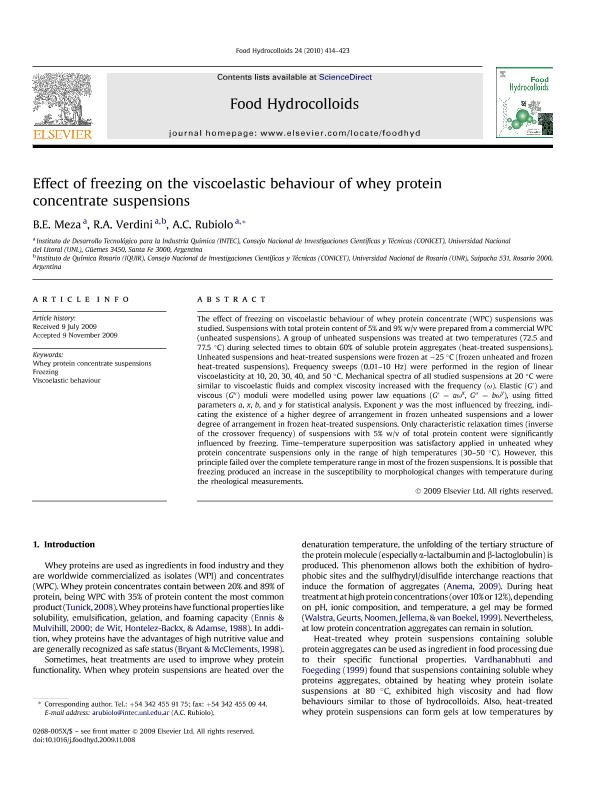Mostrar el registro sencillo del ítem
dc.contributor.author
Meza, Barbara Erica del Valle

dc.contributor.author
Verdini, Roxana Andrea

dc.contributor.author
Rubiolo, Amelia Catalina

dc.date.available
2017-03-09T17:41:44Z
dc.date.issued
2010-11
dc.identifier.citation
Meza, Barbara Erica del Valle; Verdini, Roxana Andrea; Rubiolo, Amelia Catalina; Effect of freezing on the viscoelastic behaviour of whey protein concentrate suspensions; Elsevier; Food Hydrocolloids; 24; 4; 11-2010; 414-423
dc.identifier.issn
0268-005X
dc.identifier.uri
http://hdl.handle.net/11336/13670
dc.description.abstract
The effect of freezing on viscoelastic behaviour of whey protein concentrate (WPC) suspensions was studied. Suspensions with total protein content of 5% and 9% w/v were prepared from a commercial WPC (unheated suspensions). A group of unheated suspensions was treated at two temperatures (72.5 and 77.5 C) during selected times to obtain 60% of soluble protein aggregates (heat-treated suspensions). Unheated suspensions and heat-treated suspensions were frozen at -25 C (frozen unheated and frozen heat-treated suspensions). Frequency sweeps (0.01-10 Hz) were performed in the region of linear viscoelasticity at 10, 20, 30, 40, and 50 C. Mechanical spectra of all studied suspensions at 20ºC were similar to viscoelastic fluids and complex viscosity increased with the frequency (w). Elastic (G´) and viscous (G") moduli were modelled using power law equations (G´=aw^x, G"=bw^y), using fitted parameters "a", "x", "b", and "y" for statistical analysis. Exponent "y" was the most influenced by freezing, indicating the existence of a higher degree of arrangement in frozen unheated suspensions and a lower degree of arrangement in frozen heat-treated suspensions. Only characteristic relaxation times (inverse of the crossover frequency) of suspensions with 5% w/v of total protein content were significantly influenced by freezing. Time-temperature superposition was satisfactory applied in unheated whey protein concentrate suspensions only in the range of high temperatures (30-50 C). However, this principle failed over the complete temperature range in most of the frozen suspensions. It is possible that freezing produced an increase in the susceptibility to morphological changes with temperature during the rheological measurements.
dc.format
application/pdf
dc.language.iso
eng
dc.publisher
Elsevier

dc.rights
info:eu-repo/semantics/openAccess
dc.rights.uri
https://creativecommons.org/licenses/by-nc-sa/2.5/ar/
dc.subject
Whey Protein Concentrate Suspensions
dc.subject
Freezing
dc.subject
Viscoelastic Behaviour
dc.subject.classification
Alimentos y Bebidas

dc.subject.classification
Otras Ingenierías y Tecnologías

dc.subject.classification
INGENIERÍAS Y TECNOLOGÍAS

dc.title
Effect of freezing on the viscoelastic behaviour of whey protein concentrate suspensions
dc.type
info:eu-repo/semantics/article
dc.type
info:ar-repo/semantics/artículo
dc.type
info:eu-repo/semantics/publishedVersion
dc.date.updated
2017-02-24T19:31:38Z
dc.journal.volume
24
dc.journal.number
4
dc.journal.pagination
414-423
dc.journal.pais
Países Bajos

dc.description.fil
Fil: Meza, Barbara Erica del Valle. Consejo Nacional de Investigaciones Científicas y Técnicas. Centro Científico Tecnológico Santa Fe. Instituto de Desarrollo Tecnológico Para la Industria Química (i); Argentina
dc.description.fil
Fil: Verdini, Roxana Andrea. Consejo Nacional de Investigaciones Científicas y Técnicas. Centro Científico Tecnológico Santa Fe. Instituto de Desarrollo Tecnológico Para la Industria Química (i); Argentina
dc.description.fil
Fil: Rubiolo, Amelia Catalina. Consejo Nacional de Investigaciones Científicas y Técnicas. Centro Científico Tecnológico Santa Fe. Instituto de Desarrollo Tecnológico Para la Industria Química (i); Argentina
dc.journal.title
Food Hydrocolloids

dc.relation.alternativeid
info:eu-repo/semantics/altIdentifier/doi/http://dx.doi.org/10.1016/j.foodhyd.2009.11.008
Archivos asociados
